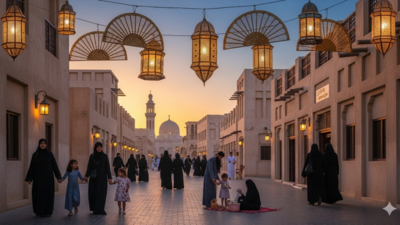ARTICLE AD BOX

During Ramadan in the UAE, expats must avoid eating, smoking, and wear modest clothing in public/Representative Image
During the holy month of Ramadan, daily life in the UAE undergoes a noticeable shift. This period is marked by fasting, prayer, and reflection for Muslims — but also brings important cultural and legal expectations for non-Muslim residents and tourists.
Whether you’re living in the Emirates or visiting during Ramadan, knowing how to respectfully navigate public behavior, work routines, and social interactions is essential. Here’s a complete guide to what’s expected.
Public behavior and legal restrictions during fasting hours
- From sunrise to sunset, it is not permitted to eat, drink, smoke, or chew gum in any public area — including streets, cars, malls, cinemas, and workplaces.
- This applies to everyone, including non-Muslims, and includes even when you are inside a vehicle.
- Federal Law No. 3 of 1987, amended in 2006, clearly addresses this under Article 313:
- Anyone caught eating, drinking, or smoking in public during fasting hours may face up to one month in jail or be fined AED 2,000.
- Eating or drinking is only allowed in private spaces, such as your home, hotel room, or private office cabin.
- The law and social norms are aligned in promoting respect for the fasting public, so even non-Muslims are expected to comply fully during daylight hours.
Dress, music, and public decorum during ramadan
- Clothing should be modest and non-revealing throughout the month, especially in public places like restaurants, malls, and events.
- Wearing tight or revealing outfits is strongly discouraged, even when attending dinners or nightlife venues.
- Playing loud music — whether in your car, at home, or on the beach — should be avoided.
- Listening to music privately is allowed, but make sure it cannot be heard outside.
- On the beach or in shared spaces, use headphones to avoid disturbing others.
- These practices reflect the general expectation of modesty and quiet reflection during Ramadan.
Navigating work, traffic, and meal timings during ramadan
- Working hours across the UAE are shortened during Ramadan, with many offices closing earlier than usual.
- This also impacts traffic patterns, with peak congestion often occurring:
- In the morning (7:00 AM to 9:00 AM)
- In the afternoon (1:00 PM to 3:00 PM)
- Roads become especially busy before Iftar (sunset), as people hurry home to break their fast.
- Avoid driving close to sunset if possible, as roads can be chaotic and hazardous at that time.
- Restaurants tend to be very crowded after sunset, when families and groups gather for Iftar.
- Make reservations in advance to secure a spot for dinner during this time.
Community engagement, charity, and social conduct
- It is appropriate and appreciated to greet people with phrases like “Ramadan Kareem” or “Ramadan Mubarak” during the month.
- Charity is a central value of Ramadan. Residents and visitors are encouraged to:
- Contribute to humanitarian programs
- Support local and international charities
- Make small gestures of kindness toward the less fortunate
- The month is also a time to engage in community and cultural exchanges.
- Whether Muslim or non-Muslim, everyone is encouraged to reflect on values such as tolerance, compassion, and gratitude.
- Interacting respectfully with neighbors, friends, and colleagues is part of embracing the spirit of the month.



.png)
.png)
.png)
















 1 hour ago
4
1 hour ago
4








 English (US) ·
English (US) ·